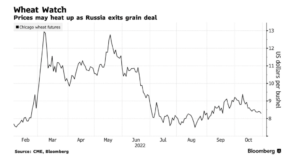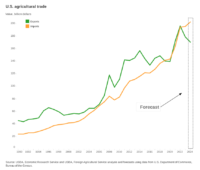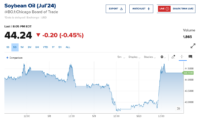Bloomberg's Clarice Couto reported this past Friday that "a surprising tax change in agriculture powerhouse Brazil has the potential to make soy grown in the world’s largest bean exporter less…
Ukraine, Turkey and UN Agree on Movement Plan for 16 Vessels from Ukrainian Port- Wheat, Corn Futures Rise
Bloomberg writers Selcan Hacaoglu, Agnieszka de Sousa, and Daryna Krasnolutska reported yesterday that, “Turkey, the UN and others looked for ways to salvage the Ukrainian grain export initiative after Moscow said it would pull out indefinitely following an attack on its Black Sea naval fleet.
“A Russian official didn’t definitely rule out a return, adding to uncertainty around the pact, which has seen more than 9 million tons of grains and other foodstuffs shipped since August. ”
The Bloomberg writers explained that, “Millions of tons of crops are waiting at sea and ports. Over 200 vessels that are part of initiative are now essentially frozen in place, Ukraine’s infrastructure ministry said on Facebook.
“Under the terms of the deal, all vessels need to be inspected before entering or leaving Ukrainian ports.”
Wall Street Journal writers Jared Malsin and Alistair MacDonald reported yesterday that, “Russia’s decision threatens to raise the cost of food globally, putting economic pressure on Ukraine’s Western allies as well as Middle Eastern and Asian countries that are highly dependent on its exports.
“That could deepen a global hunger crisis in which tens of millions of people worldwide have been pushed closer to starvation. The suspension of the deal effectively reimposes a full blockade on Ukraine’s ports, escalating Russia’s use of food as a weapon to pressure Ukrainian allies to cease their support for Ukraine or risk threatening the global food supply.”
The current queue with grain has accumulated in the Black Sea since September, when Russia started deliberately delaying the functioning of the corridor and seeking to undermine the deal. Russia took the decision to resume its hunger games long ago and now tries to justify it 2/2
— Dmytro Kuleba (@DmytroKuleba) October 30, 2022
Meanwhile, Bloomberg writers Kim Chipman and Tarso Veloso Ribeiro reported yesterday that, “Traders are bracing for a fresh spike in grain prices after Russia’s exit from a deal allowing Ukraine crops to move from the Black Sea to the countries most in need of them roils markets anew.
“The sudden move by Russia has left leaders scrambling to rescue the UN-and-Turkey-brokered agreement credited with saving vulnerable populations from risk of starvation.”

“How much of a price jump is harder to predict since the safe-passage deal was already set to expire in mid-November if no agreement is reached to extend it,” the Bloomberg article said.
And Shashank Bengali, Abdi Latif Dahir and Natalie Kitroeff reported in today’s New York Times that, “World leaders on Sunday urged Russia to reconsider its suspension of an agreement that allowed the export of grain trapped by the war in Ukrainian ports, warning that Moscow’s decision could unleash dire consequences on a hungry planet.”
The Times article noted that, “On Sunday, as world leaders tried to persuade Moscow to reverse course, the office of the United Nations secretary general, António Guterres, said that one of his objectives was ‘removing the remaining obstacles to the exports of Russian food and fertilizer.’
“Mr. Guterres postponed travel to an Arab League summit so he could instead ‘engage in intense contacts’ over Russia’s grain-deal decision, his office said. And the Russian state media reported that officials from Turkey were in touch by phone with Russian officials ‘at all levels’ over the fate of the agreement, which had been a major coup for the Turkish government.”
And today, Reuters writers Nevzat Devranoglu and Ezgi Erkoyun reported that, “Turkey will continue its efforts for the Black Sea grain export deal despite Russian hesitancy, President Tayyip Erdogan said on Monday after Moscow suspended its participation in the initiative at the weekend.”
Civilian cargo ships can never be a military target or held hostage. The food must flow. #BlackSeaGrainInitiative pic.twitter.com/sqnIVMmyny
— Amir M. Abdulla (@AmirMAbdulla) October 31, 2022
Also today, Reuters writer Yesim Dikmen reported that,
Turkish and United Nations teams restarted vessel inspections under the Black Sea grain exports deal, a U.N. spokesperson for the initiative told Reuters on Monday, after Russia suspended its participation at the weekend.
“The U.N. has said it agreed with Ukraine and Turkey on a movement plan for 16 vessels on Monday – 12 outbound from Ukrainian ports and 4 inbound – and it intends to inspect 40 outbound vessels anchored near Istanbul during the day.”
Today 12 🚢s left 🇺🇦 ports. @UN & 🇹🇷delegations provide 10 inspection teams to inspect 40 🛳️s aiming to fulfill the #BlackSeaGrainInitiative. This inspection plan has been accepted by the 🇺🇦 delegation. The russian delegation has been informed.
— Oleksandr Kubrakov (@OlKubrakov) October 31, 2022
At the same time, the passage to 🇺🇦 ports for loading is allowed for 4 🚢s that have already passed inspection in the Bosphorus the day before. The inspection group was composed of representatives of the @UN, 🇹🇷, 🇺🇦 & russia.
— Oleksandr Kubrakov (@OlKubrakov) October 31, 2022
The IKARIA ANGEL 🚢 loaded w/ 40 K tons of grain is among the vessels that have left 🇺🇦 ports. This is the 7th 🛳️ chartered under the @UN @WFP. These foodstuffs were intended for the residents of Ethiopia, who faced the real possibility of mass starvation. pic.twitter.com/hy8nKcF168
— Oleksandr Kubrakov (@OlKubrakov) October 31, 2022
Wall Street Journal writers Jared Malsin and Alistair MacDonald reported today that, “The price of wheat and corn rose early Monday even as ships carrying grain left Ukraine’s ports despite Russia saying it would suspend its participation in an agreement that has allowed Ukrainian grain exports for months.
“The price of wheat was up by 5.7% and corn by more than 2.5% in early morning trade.”
The Journal article stated that, “The Joint Coordination Center, which monitors the functioning of a safe corridor for ships carrying grain across the Black Sea, said Turkish, Ukrainian, and U.N. officials agreed on a plan for 16 ships to move on Monday, including 12 outgoing and four incoming vessels on their way to collect grain from Ukraine.”
Financial Times writers William Langley, Nic Fildes and Emiko Terazono reported today that, “Wheat and corn futures traded in Chicago jumped on Monday following Russia’s withdrawal from a UN-backed deal that allowed the passage of million of tonnes of grain through the Black Sea.
“Wheat futures on the Chicago Board of Trade rose as much as 7.7 per cent to $8.93 a bushel on Monday morning, and was later trading up 5.7 per cent at $8.29 a bushel. Corn rose almost 3 per cent to $7 per bushel.”
The FT writers added that, “The UN, Turkey and Ukraine, who had been working together with Russia to move the grain through the Black Sea, informed Moscow that 16 vessels both inbound and outbound were going to move through the grain corridor on Monday. The UN said that some of these ships had set sail.”







